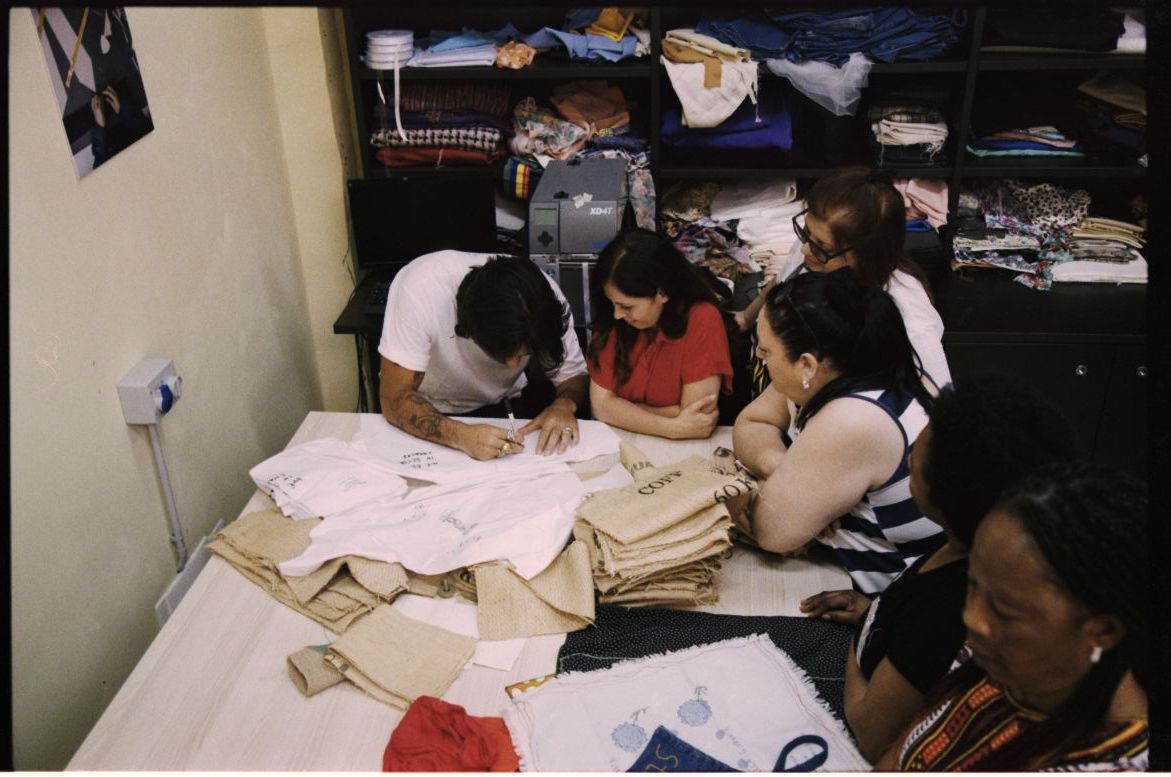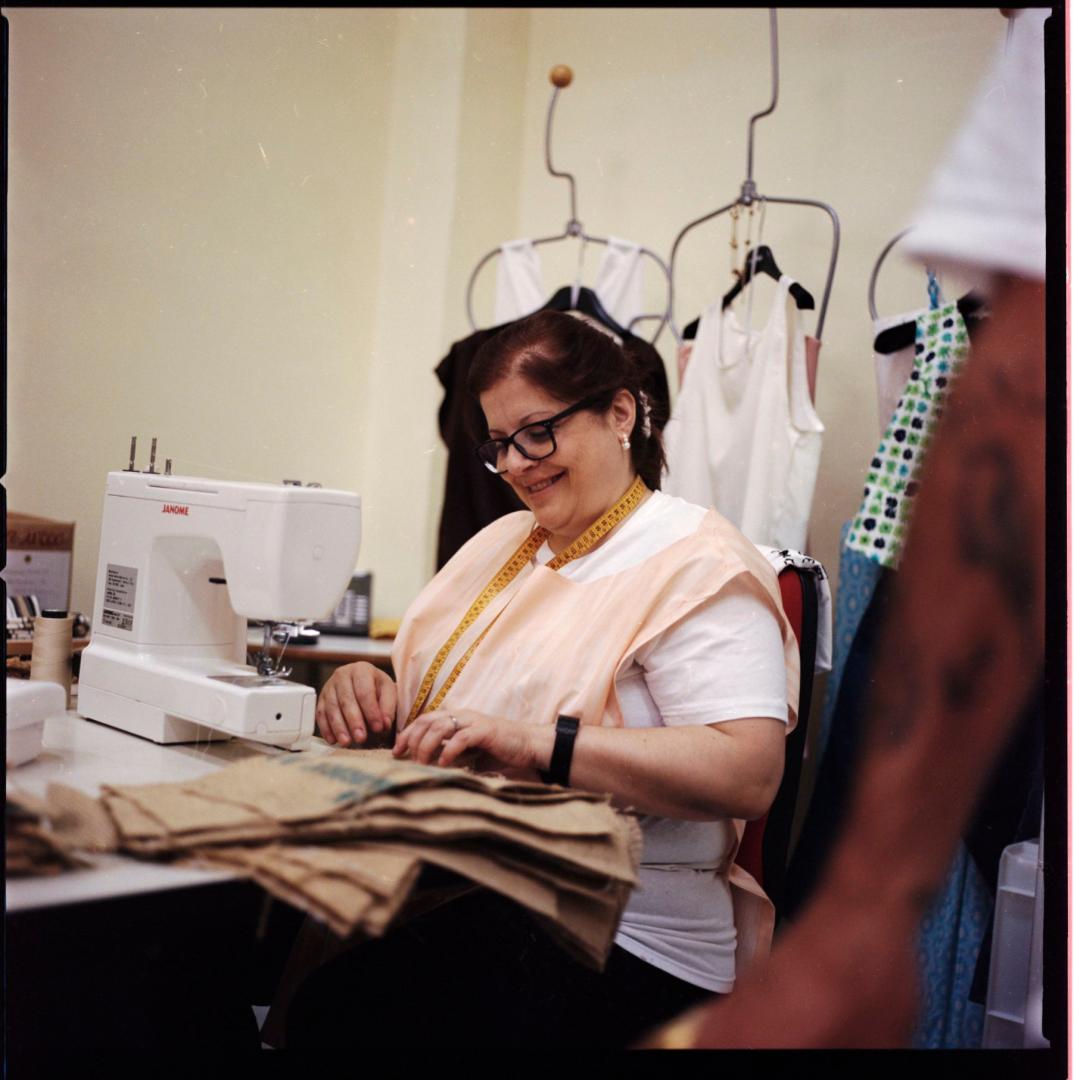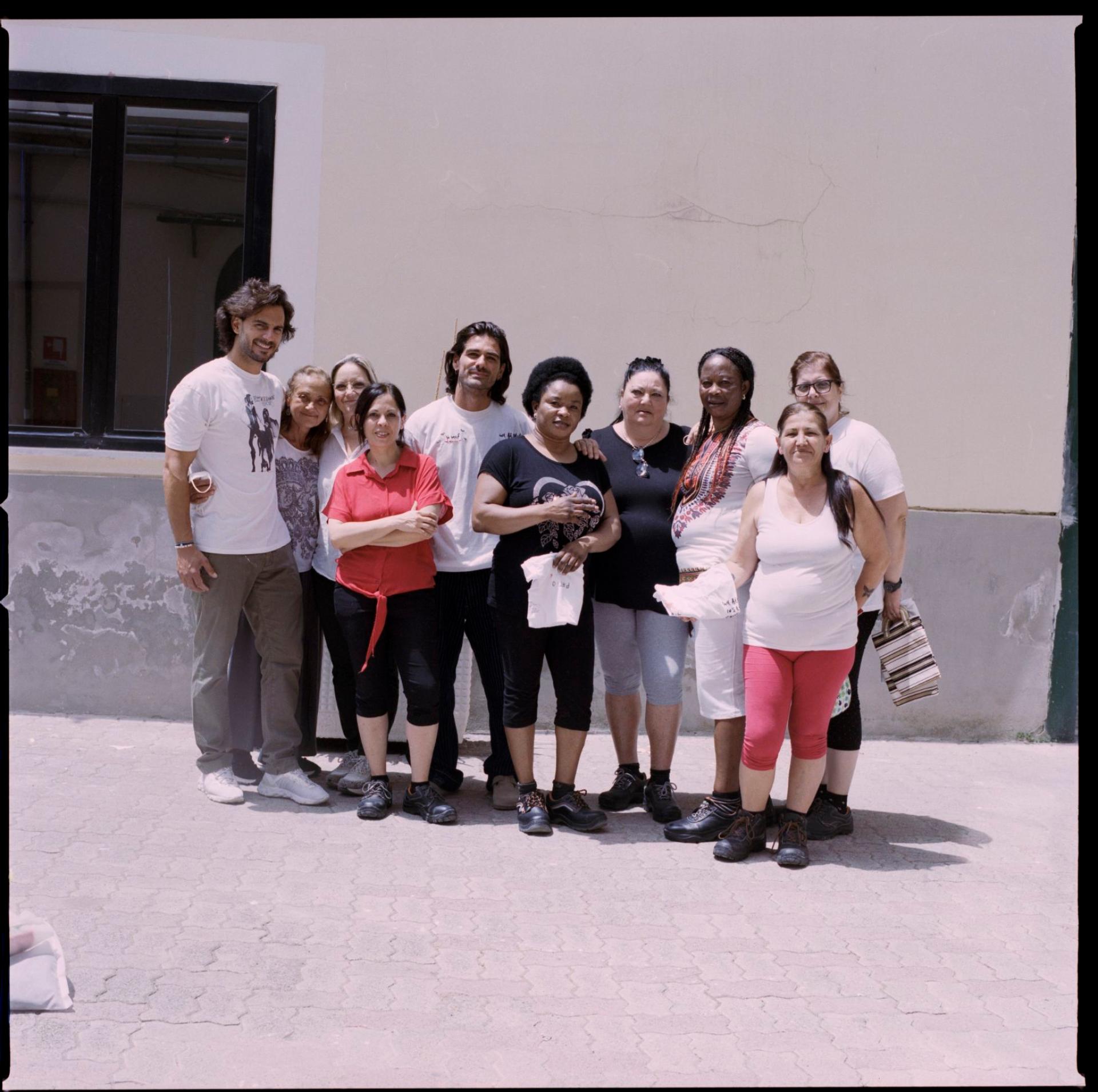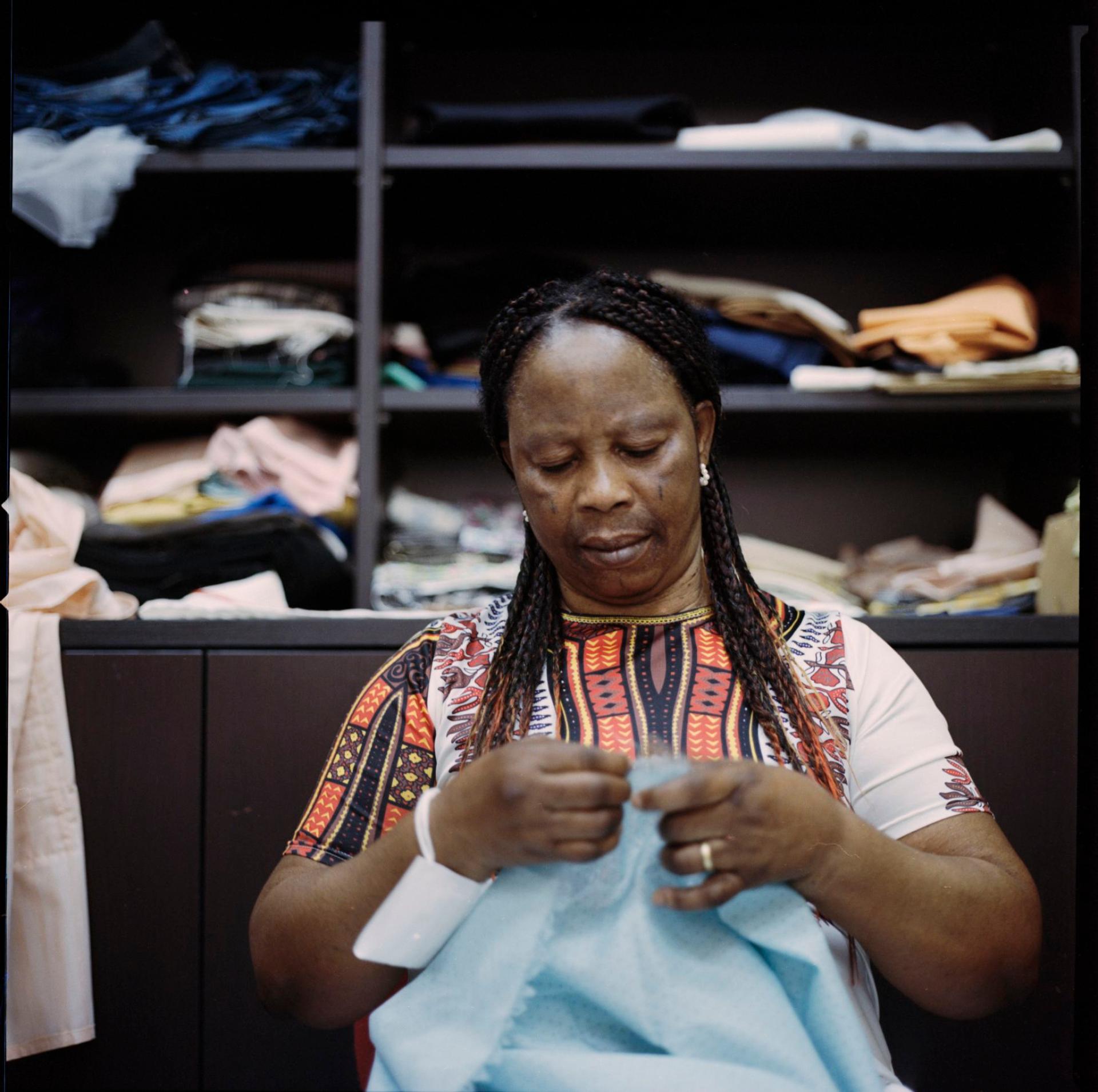Palingen-Ethical and sustainable fashion
Basic information
Project Title
Category
Project Description
Do you believe in second chances in life? Can fashion be used to empower disadvantaged women while protecting the planet? Yes!
Palingen is an ethical and sustainable tailoring laboratory providing a new opportunity to vulnerable women and textile waste. We recover clothes and fabrics otherwise destined for disposal and regenerate them in new collections and accessories manufactured by female inmates that intend to thrive into a new beginning.
Where others see worthless we see opportunities.
Geographical Scope
Project Region
Urban or rural issues
Physical or other transformations
EU Programme or fund
Which funds
Description of the project
Summary
Palingen is an ethical and sustainable tailoring laboratory located inside a female prison, providing new life opportunities to disadvantaged women and textile waste. We recover clothes and fabrics otherwise destined for disposal and upcycle them in new collections and accessories manufactured by female inmates that intend to thrive into a new beginning.
The idea sprang after a volunteer period in the female correctional facility of Pozzuoli (Naples, Italy) where I noticed the strong creative potential and incredible desire for redemption of the inmates. Due to the difficult situation and lack of economic resources, inmates must usually wear old used clothes resulting from donations. What struck me the most was their commitment in adjusting and restyling those clothes in order to feel the enthusiasm of wearing something "new". Witnessing this creative spirit and desire for rebirth, along with the intention of encouraging them to tap into this potential in order to facilitate their inclusion in the labour market and to provide them new life opportunities, pushed me to found Palingen, a social impact startup with the mission of increasing inclusivity and sustainability in the fashion industry.
Our mission is to empower female inmates through work. Accordingly, inmates are regularly hired and remunerated to manufacture fashion products, allowing them to gain skills in the art of tailoring through a learning-by-doing process. A skill that is marketable and may facilitate their social inclusion at the end of the detention period, reducing recidivism. In addition, in light of the disastrous environmental impact generated by the fashion industry - among the most polluting in the world - we mainly work recover old clothes and leftover fabrics to create our collections and accessories in order to reduce waste.
We believe that those who have mistaken have the right to a second chance and that the best form of sustainability is the creative reuse of textile waste.
Key objectives for sustainability
Our key objective in terms of sustainability is the reduction of textile waste.
According to the Circular Economy Action Plan of the EU Greed Deal, textiles are the fourth highest-pressure category for the use of primary raw materials and water and it is estimated that less than 1% of all the textiles worldwide are recycled into new textiles. Even when recycled, the break down of materials implies a great use of energy with a severe impact on the environment. It comes as no surprise that the EU is thinking of a comprehensive strategy for textiles to boost circularity and encourage new business models to address the above issues. In order to achieve our objective, we recover fabrics as well as old and unsold clothes or other fashion products, otherwise destined for disposal, to upcycle and regenerate them into new collections and accessories. We believe in the value of circularity and constantly research for companies and producers that have unused materials and products to give them a new life, avoiding their disposal in landfills. Moreover, we also engage in the production of sustainable packaging by using mainly old clothes that are not suitable to be regenerated in new products and by making the same packaging a reusable item, e.g. bags, pouches etc., in order to maximise our waste reduction goal. Our business model allows us to contribute to the reduction of waste as well as to reduce energy consumption and greenhouse gas emissions that would otherwise be used to recycle materials or to produce new raw materials.
As of today we have upcycled more than 3000 kg of old and unsold clothes and products as well as more than 15000 mt of leftover fabrics and..the best is yet to come!
Considering our results and operating model mentioned above, our project can be a perfect example of circularity in one of the industries in most need of sustainability, fashion, and may help to scale up the circular economy from front-runners to mainstream economic players.
Key objectives for aesthetics and quality
Fashion is by definition associated with aesthetics. We can easily affirm that fashion is one of the best and most popular ways to convey and represent aesthetic features. In order to maximise our objective in terms of aesthetics, we research for high-quality fabrics that brands and producers have in stock as surplus or deadstock remaining from previous collections to regenerate them into new fashion collections and accessories with the help of young designers that share our same values and want to contribute to the industry's change. Italy's fashion tradition has enabled the proliferation of companies active in the fashion business that inevitably generate a significant quantity of quality leftover textile material that can be found on dedicated marketplaces. We love to spend time and effort to uncover unused materials and put them back into circulation. In this respect, our most relevant and valuable "targets" are luxury brands. Luxury brands are known for their excessive production and dispose of large quantities of unused materials especially considering that they disregard fabrics that do not fully correspond to their request and are, even slightly, unperfect.
The quality of experience of our customers and business partners stems directly from the purpose behind our project: providing a new opportunity and a new life to people and fabrics. People are always more interested in social justice as well as environmental issues and intend to contribute to making a change. For this reason the satisfaction and experience goes beyond the beauty and functionality of the product, lying in the appreciation of generating a positive impact on the lives of socially disadvantaged people and on the environment as well as in the awareness in contributing to the change of the fashion industry. In light of the above, an ethical and sustainable fashion initiative can be exemplary in terms of aesthetics and quality of experience, inspiring others to join a necessary change.
Key objectives for inclusion
Inmates faces numerous challenges, social exclusion and marginalization above all. The social inequality produced by incarceration reduces, and in certain cases denies, the access to rights, resources and opportunities that are fundamental for the social integration of former prisoners, preventing them from participating fully in the life of the society in which they live. Female inmates are even more disadvantaged since they suffer from an already existing gender gap. Our goal is to provide female inmates with a new opportunity for social integration and we believe that work is among the most valuable tools to achieve this objective since it provides purpose, skills and financial resources, as well as a sense of self-worth and well-being of crucial importance to people in disadvantaged conditions. Social integration contributes to the reduction of social inequality generating a significant positive impact on communities. Also, the reduction of recidivism plays an important part in the reduction of public expenditure on prisons.
In addition, we intend to fight the prejudice against former prisoners, often labelled as untrustworthy people from society. For this reason, companies and designers that we collaborate with are fully involved in the manufacturing process by directly transferring their skills and know-how, required for the realization of the collection or accessory, to our workers. This is usually done through full-day training classes held by a designer or product expert and focused on the product(s) that will be manufactured. Similarly, fashion designers and stylist are invited to engage in the upskilling of our workers in certain manufacturing techniques or styles by arranging specific trainings. Direct civic engagement contributes to raising awareness around the issues above. We believe that the combination between working opportunity and direct civic engagement makes our project a true example of social integration and inclusion.
Results in relation to category
As mentioned, the textile and fashion industry is among the most polluting industries in the world, featuring a significant exploitation of energy and natural resources as well as a very low rate of reuse and recycle of waste. In the recent years, this has been exacerbated by the so-called "fast-fashion" industry which has been also associated with the exploitation of workers in poor social and economic conditions. The awareness among the public opinion of these issues has encouraged a rising demand for a change in the industry towards a more ethical and sustainable model. Palingen contributes to the transformation of the fashion industrial ecosystem by adopting more sustainable and social inclusive practices maintaining, at the same time, the intrinsic beauty of fashion. In this respect, our project has already provided significant results and impacts in all of our objectives. As anticipated, as of today, we achieved to realize more than 20 collaborations, we have expanded our workforce from 5 to 8 inmates in the first 9 months of activity and upcycled more than 3000 kg of old and unsold clothes and products as well as more than 15000 mt of leftover fabrics, constantly increasing the quality of our materials in order to maximise the beauty and aesthetics of our creations.
Moreover, we raise awareness around the negative social and environmental impacts of the fashion industry (especially fast-fashion, as mentioned) and promote the adoption of sustainable and inclusive practices in the industry through media, social media and through the participation to webinars, talks and encounters that cover these topics. This allows us, also, to get inspired by best practices adopted by other projects and to expand our business network in order to create synergies and give birth to meaningful initiatives.
How Citizens benefit
Citizens and civil society are constantly involved in the implementation of our project, this represents one of our most valuable "assets". The ways of being involved may be different.
Firstly, as anticipated, our business model foresees an involvement of designers and product experts in the manufacturing phase since they provide the creative and technical input that is required for the realization of products and collections. In this phase, our partners team up with our responsible of production in order to transfer the necessary know-how and skills to our workers. We have also partnered with an Italian university to allow students who intend to start a career in the fashion industry to be involved in the design and production phase.
Further, people with a significant experience and expertise in the art of tailoring and design are welcome to contribute to the training of our workers by sharing their know-how. This is done either through the organization of full classes focused on teaching a specific technique or skill, either through the participation to the works of our tailoring lab for a defined period (e.g. two days a week for three months).
In both cases, the benefits derived from the involvement of citizens and civil society are significant and evident. The involvement of people with a broad and consolidated tailoring skill set provides a very valuable contribution to achieve high standards in terms of aesthetics and quality of our realizations. Moreover, attending trainings and working in close contact with people with a consolidated expertise allows our workers to develop tailoring abilities and skills capable of responding to the needs of the "outside" labour market, increasing their chances of social integration.
Also, the involvement of citizens and civil society allows to reduce the prejudice around former prisoners and raises awareness on the issues we intend to tackle, i.e. pollution and social exclusion.
Physical or other transformations
Innovative character
The fashion industry is among the largest polluter in the world (along with the oil industry) and the environmental damage is increasing as the industry grows. Also, on the human and social side, the fashion industry creates significant damage since production sites are often located where the labor costs are cheaper and the workers' rights non existent. As explained, all of this has been aggravated by the "fast-fashion" phenomenon. These social and environmental unsustainable practices have become known to the public that is firmly demanding for a change and our project intends to contribute significantly to this change. We team up with partners and stakeholders that share our same values for the achievement of this common goal.
As explained previously, our business model allows us to empower female inmates by upskilling them in the art of tailoring and by providing them a financial remuneration. Also, by working mainly with old clothes and leftover fabrics, following the circularity principle, we contribute to the reduction of textile waste in the fashion industry.
Our environmental sustainability is guaranteed and traceable since we work with leftover textiles and old clothes that are mainly provided by our stakeholders (i.e. brands, suppliers, etc.). In this respect, as mentioned, we keep track of the quantity of textile and clothes that are regenerated and upcycled. Also, our positive social impact is evident since our laboratory is physically located inside the female correctional facility and we inevitably employ female inmates. In this regard, the remuneration of the inmates is regulated by specific legal provisions that establish a fair level of compensation for our workers and that we fully comply with. We intend to provide an innovative solution for companies that actively and concretely pursue a fashion revolution and genuinely desire a more sustainable, fair and inclusive fashion industry.
Learning transferred to other parties
Replication consists in the use of the same methods, techniques and practices developed / used in the project, in the same way and for the same purposes, in collaboration with other parties and in different contexts. In this respect, we believe that Palingen - Ethical and Sustainable Fashion is a highly replicable project that would provide clear and significant benefits if transferred to other contexts. In our view, the best replicability factors are the level of standardisation, regulatory, stakeholder acceptance and business model of the project.
The solution of upcycling old clothes and fabrics with the manufacture of socially disadvantaged people (that can include not only inmates of course but also homeless, migrants etc.) may be implemented as a common approach for different brands and companies active in the fashion industry. Italy has adopted legal provisions that facilitate the implementation and replicability of projects with a social and environmental purpose and the adoption of the EU Social Economy Action Plan suggests that soon, also at a EU level, the regulatory framework will allow the full development of the social economy and facilitate synergies between companies in the EU. In terms of stakeholder acceptance, consumers (globally) want to contribute to change and seek for projects and products that satisfy this need. For the same reason, companies and brands intend to identify real sustainable and ethical solutions that do not risk of being negatively qualified as "greenwashing". A more harmonized regulatory framework, in combination with the increasing stakeholder acceptance, could enable the application of this solution under different settings and in different contexts such as, e.g., in another EU member state. Finally, it is clear that the replicability of the project would amplify the positive social and environmental impact generated by expanding the number of disadvantaged people involved and quantity of waste reduced.




